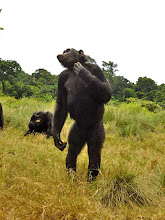During my years in the 70´s as a Press Secretary with Amnesty International there were quite a few governments in the world that held no sensitive ear whatsoever to the rule of law and the global pressure as to human rights issues repeatedly violated in their respective countries.
"They couldn´t care less that the whole world was watching the autrocities committed by their countries".
President Hugo Banda in Malawi was one. Bokassa in the Central African Republic and Khomeini in Iran were others.
Even the dictators of South America at that time held at least a fragment of consciousness on what the world thought of them and their tarnished global image and tried to "cover up their crimes against humanity " as well as they could. If possible.
In watching the morning news and the interview of Eritreas President Isaias Afwerki by Swedish journalist Donald Boström in connection with the imprisonment of Swedish citizen and journalist Dawit Isaak I still feel the same shock as I did then, about Eritrea´s total ignorance of UN resolutions and the rule of law today.
(See the full interview above)
The next feature in the morning TV News is about the North Corean underground nuclear test and they way the world starts to awake and react on their escalating nuclear power plays.
So slowly and cautiously. Tip toe commenting. Pinning a lot of hopes on China´s reactions.
"We all said something, and we agreed more or less and said the same thing," expresses the US UNrepresentative in a statement which is as inflammatory as the weak coffee I am sipping.
Well it hasn´t changed much since the 70´s. The polarization is as great as it has always been. The frustration of our lack of means, measures, steps and actions to influence these alarming situations are still there to match.
"They couldn´t care less that the whole world was watching the autrocities committed by their countries".
President Hugo Banda in Malawi was one. Bokassa in the Central African Republic and Khomeini in Iran were others.
Even the dictators of South America at that time held at least a fragment of consciousness on what the world thought of them and their tarnished global image and tried to "cover up their crimes against humanity " as well as they could. If possible.
In watching the morning news and the interview of Eritreas President Isaias Afwerki by Swedish journalist Donald Boström in connection with the imprisonment of Swedish citizen and journalist Dawit Isaak I still feel the same shock as I did then, about Eritrea´s total ignorance of UN resolutions and the rule of law today.
(See the full interview above)
The next feature in the morning TV News is about the North Corean underground nuclear test and they way the world starts to awake and react on their escalating nuclear power plays.
So slowly and cautiously. Tip toe commenting. Pinning a lot of hopes on China´s reactions.
"We all said something, and we agreed more or less and said the same thing," expresses the US UNrepresentative in a statement which is as inflammatory as the weak coffee I am sipping.
Well it hasn´t changed much since the 70´s. The polarization is as great as it has always been. The frustration of our lack of means, measures, steps and actions to influence these alarming situations are still there to match.
PE





































